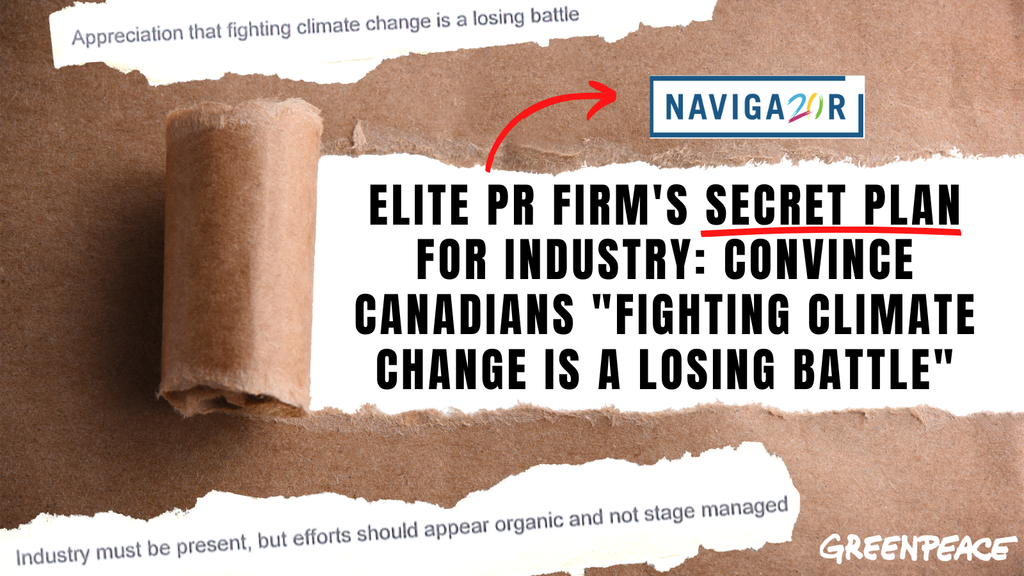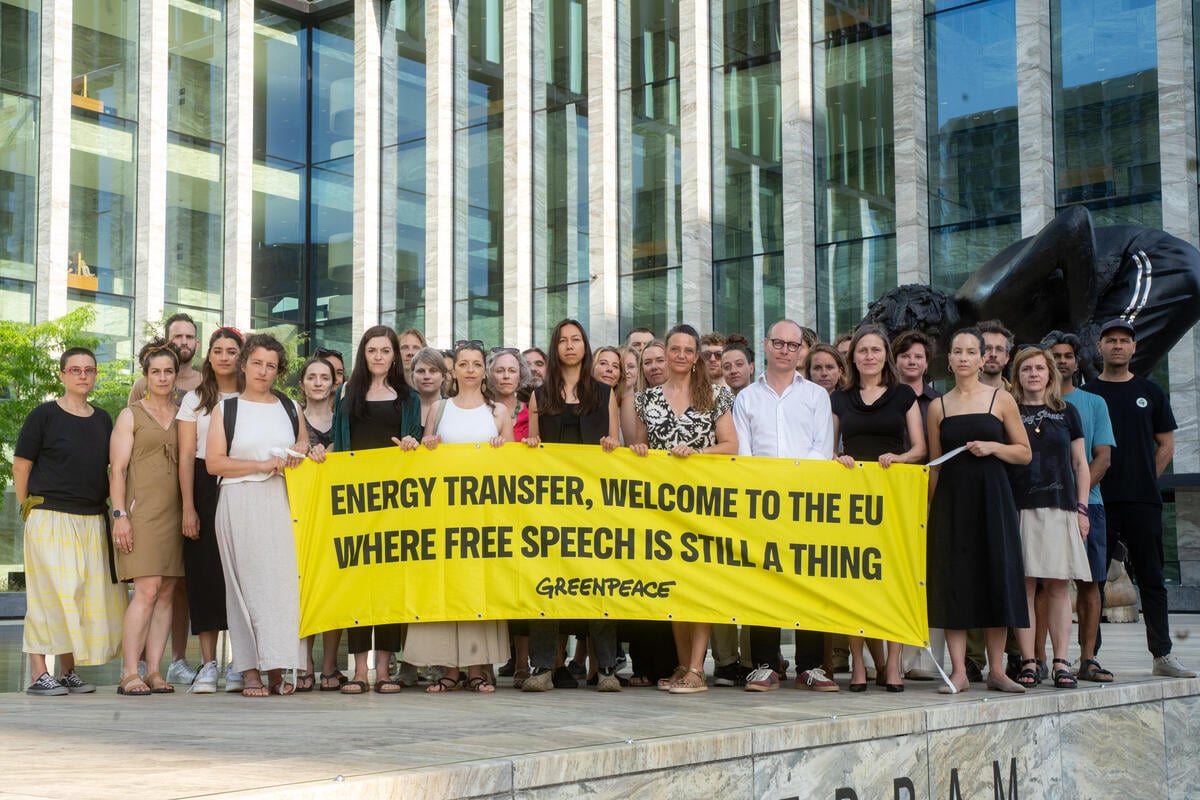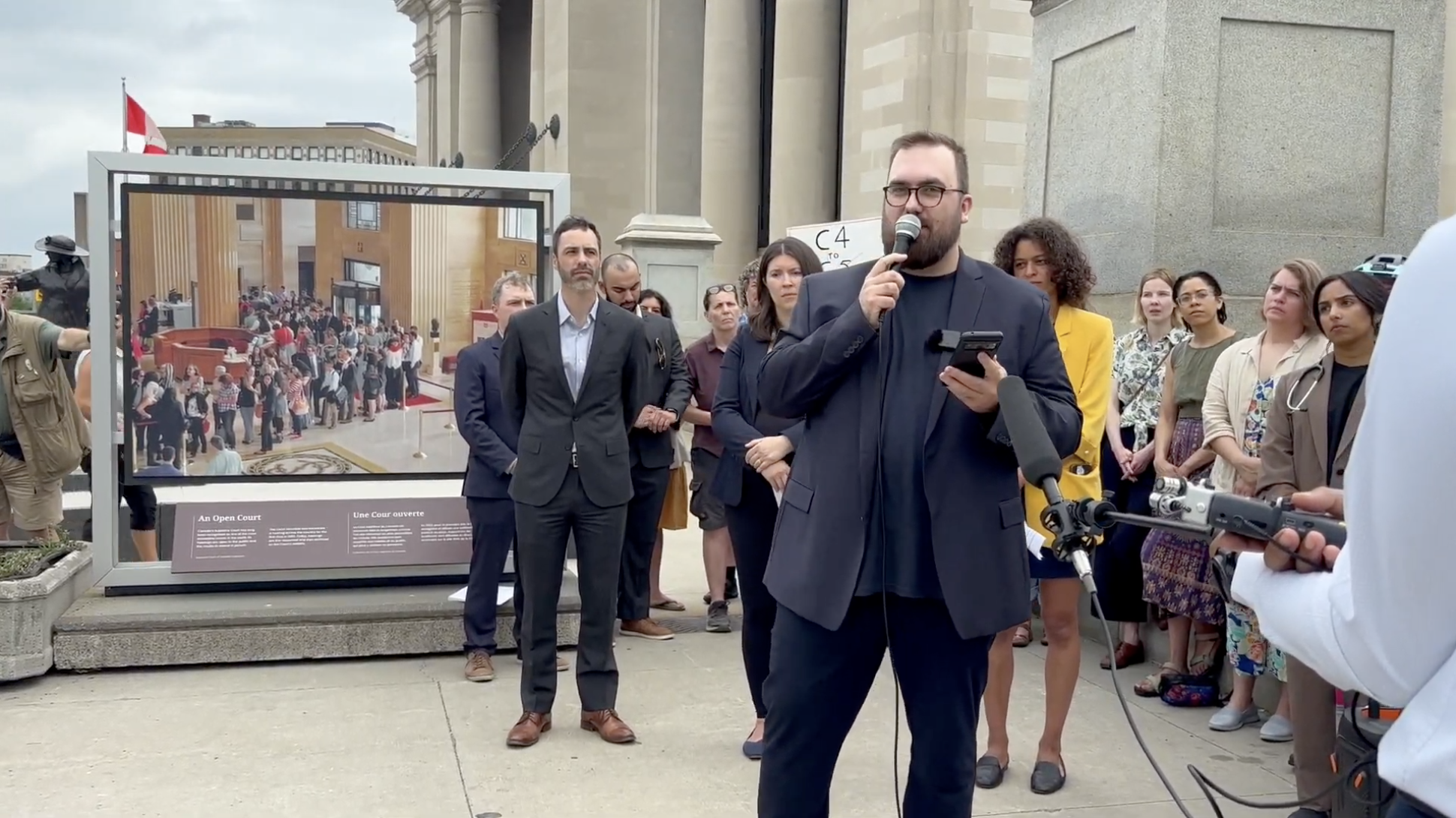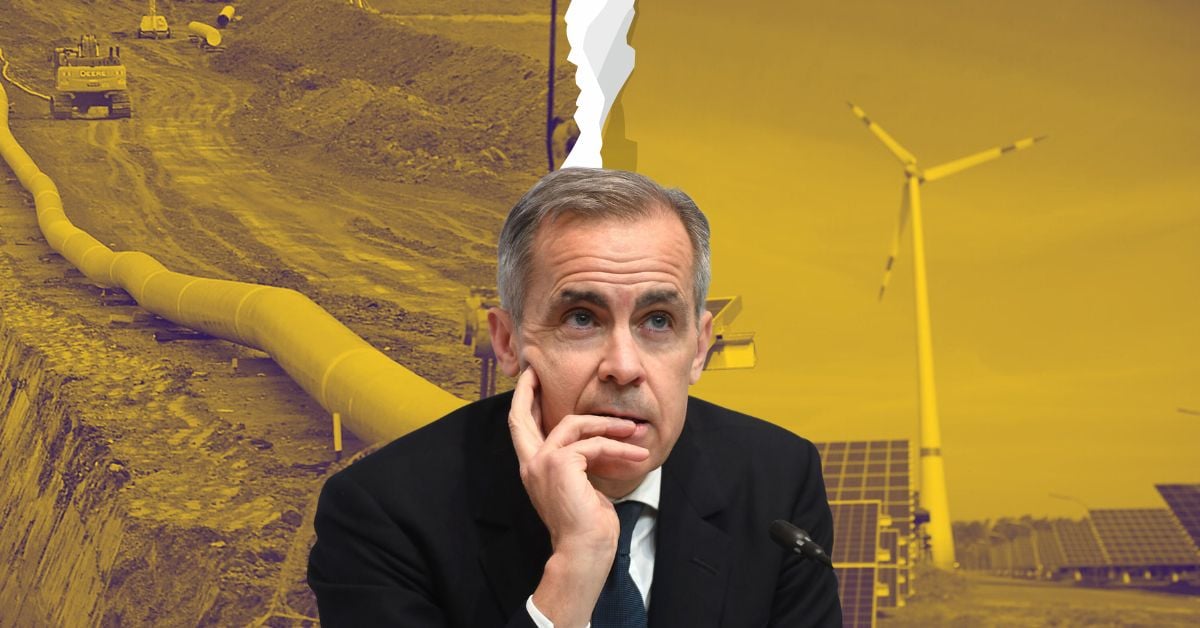
FOR IMMEDIATE RELEASE
7 October 2020
TORONTO – Greenpeace Canada has obtained a leaked copy of a confidential strategy designed to undermine support for the federal government’s proposed Clean Fuel Standard (CFS). The “anti-CFS campaign strategy” seeks to convince Canadians that it isn’t worth increasing fuel costs to reduce greenhouse gas emissions because “fighting climate change is a losing battle.”
“Every individual and organization involved in the campaign against the Clean Fuel Standard should take a long, hard look in the mirror,” said Keith Stewart, senior energy strategist with Greenpeace Canada. “They should ask themselves if they really want to convince Canadians that ‘fighting climate change is a losing battle’ because that is the ultimate self-fulfilling prophecy.”
The strategy document (Canadians for Fairness in Clean Fuel Policy) was prepared in January 2018 by the public relations firm Navigator, which bills itself as “Canada’s leading high-stakes strategic advisory and communications firm” and has a registered trademark tag-line of “when you can’t afford to lose”. The document does not name Navigator’s client but proposes to build a “broader than Big Oil” coalition to oppose the CFS by recruiting industry associations, companies, think tanks, labour groups and the opposition Conservatives. It proposes a “Secondary role for industrial players (not front and centre): Industry must be present, but efforts should appear organic and not stage managed.”
See backgrounder below for evidence of the strategy’s implementation.
“Looking at this strategy and how the anti-CFS strategy has played out over the last two years, it is clear that the opposition was never about a good-faith effort to amend the Clean Fuel Standard, but rather an underhanded attempt to kill it completely. While the rest of us do our part to reduce emissions, Big Oil and its behind-the-scenes partners are once again resisting doing the bare minimum,” said Stewart.
Following lobbying by the Canadian Association of Petroleum Producers in March, the federal government delayed the implementation of the CFS, which would require fuels like gasoline and diesel to burn more cleanly. New proposed regulations are expected this fall.
-30-
For more information, please contact:
Jesse Firempong, Communications Officer, Greenpeace Canada
+1 (778) 996-6549 or [email protected]
BACKGROUNDER
The Canadians for Fairness in Clean Fuel Policy strategy has three main components:
- to launch a “counterpunch” after the draft regulation is released;
- to build a coalition “broader than Big Oil” so other voices can carry the campaign’s messages; and
- to foster an “appreciation that fighting climate change is a losing battle” by convincing the public that the costs of the CFS aren’t justified .
The campaign proposes a clever but deceitful strategy. Participants are urged to support the general aims of the federal climate change plan (“Quietly support government’s climate change agenda” on page 18) while opposing a key measure that would accomplish those aims (on page 4, the Navigator document acknowledges the Clean Fuel Standard is “the single biggest piece of its [the federal government’s] carbon reduction strategy”).
The campaign would use cost arguments to kill (not modify) the Clean Fuel Standard, while downplaying the possibility/desirability of fighting climate change overall:
“Engaging the government in a discussion about potential alternative strategies will require a dedicated campaign to initiate a conversation about:
- affordability
- economic consequences &
- questionable (global) impact.” (page 8)
Evidence of strategy deployment
There is strong evidence that the strategy has been deployed. In the document, Navigator says it has already “Engaged key industry players” and “Found strong support for a nuanced anti-CFS effort, while maintaining fair and reasonable positioning and acceptance of climate change science” (page 5). It has also “conducted a program of qualitative research to better understand attitudes, opinions and beliefs regarding environmental policy in Liberal-held swing ridings.”
The table below compares what was in Navigator’s 2018 strategy with what has happened since.
| What’s in the Navigator strategy? | What happened? |
| The plan proposes using industry associations to carry the campaign messages (rather than oil companies doing so directly). Industry associations are also identified as stakeholders who can “engage and organize in order to activate and mobilize” | The Canadian Manufacturers and Exporters website states “We have also put together a coalition on the CFS and there are a number of different opportunities to get engaged.” The Canadian Chamber of Commerce has launched a public campaign against the Clean Fuel Standard asking “concerned Canadians” to contact their MP.The Canadian Fuels Association and Chemistry Industry Association of Canada have spoken out against the CFS.The Canadian Association of Petroleum Producers made opposition to the CFS part of their 2019 election campaign (see their press release and CAPP’s Vote Energy platform that includes “Withdraw the proposed Clean Fuel Standard (CFS) in its entirety”). In March 2020, CAPP also asked for a halt to the development of the regulation and a 3 year delay (from 2022 to 2025) in its implementation. |
| The digital strategy proposes to use the “Canadians for Affordable Energy Solutions” website, Twitter and Facebook to “establish an online presence for a broad-based coalition of interests” and “Engage with receptive Canadians where they reside – online” | The Canadians for Affordable Energy (CAE) website, Twitter and Facebook pre-dates the Navigator proposal (CAE was established in 2016). CAE does regularly attack the Clean Fuel Standard. The CAE website doesn’t identify members or financial supporters, but it has spent thousands of dollars on Facebook ads attacking the Clean Fuel Standard. On October 6, CAE released a report that echoes the Navigator strategy’s core messages, which is being amplified by the Canadian Association of Petroleum Producers’s front group Energy Citizens. The Canadian Chamber of Commerce has established a “Fresh Fuel Standard” webpage asking Canadians to contact their MPs and tell them “Now more than ever, raising fuel prices by 30%, adding $15 billion per year in costs, is not the path forward to help Canadians or our natural world.” |
| The strategy recommends Benjamin Dachis (Associate Director, Research, C.D. Howe Institute) as a message surrogate. | On July 19, 2018 the C.D. Howe Institute releases an E-brief (Speed Bump Ahead: Ottawa Should Drive Slowly on Clean Fuel Standards) authored by Benjamin Dachis that concludes: “A clean fuel standard could have a large economic cost relative to pure emissions pricing, especially on energy-intensive, trade-exposed sectors…. Before proceeding with the plan, Ottawa should make it clear why Canada needs a CFS in addition to a price on emissions. In the absence of such a clear case, Ottawa should slow down on its CFS plan.”The same day that the C.D. Howe report is released, the Canadian Manufacturers and Exporters issues a press release Canadian Manufacturers & Exporters Echoes C.D. Howe Institute Warning on Clean Fuel Standard. |
| Andrew Scheer is identified as another message surrogate. | Scheer wrote an open letter to Prime Minister Trudeau on July 8, 2019 denouncing the Clean Fuel Standard as a “secret tax”. |
| Imperial Oil is identified as an “industry peer” that can provide “financial contribution” and “coordinated, moderate comment” | Imperial Oil CEO Rich Kruger has spoken out publicly against the CFS and Imperial Oil has repeatedly lobbied the federal government to weaken and/or delay it (ATIP document). |
| Engage NGOs and think tanks, like the Montreal Economic Institute (MEI) to report on the CFS and costs to households | In September 2020, the MEI released a report entitled, The CFS: A Measure That Will Hurt Canada’s Economic Recovery. The report makes use of language like the “snowball effect” of regulatory costs, including on consumers. This language is virtually identical to the Navigator strategy’s recommendation to “focus on snowballing costs.” |
CFS Timeline
The timeline below draws on Environment Canada’s website, the Navigator report and the material in the table above.
- August 2016 — Minister McKenna informed petroleum industry representatives that Canada would be regulating the carbon content in fuels through a performance-based standard.
- November 2016 — Formal notice of intent to regulate fuels.
- December 2016 — The Pan-Canadian Framework on Clean Growth and Climate Change stated, “The federal government, working with provincial and territorial governments, industry, and other stakeholders, will develop a clean fuel standard to reduce emissions from fuels used in transportation, buildings and industry.”
- December 2017 — CFS Regulatory Framework establishes partition between liquid (80% transport), solid, and gaseous fuels. Environment Canada establishes a multi-stakeholder consultative committee that consists of representatives from key industry associations, academia, environmental non-governmental organizations, provincial and territorial governments and other federal departments.
- January 2018 – Navigator anti-CFS campaign strategy document shared with potential partners.
- July 2018 – “Punchback” campaign from industry (C.D. Howe paper released, immediately supported by Canadian Manufacturers and Exporters, federal Conservative leader attacks CFS)
- Fall 2018 – Environment Canada establishes the Clean Fuel Standard Task Group on Emission-Intensive and Trade-Exposed Sectors “to better understand the concerns of these sectors and to consider options to mitigate competitiveness impacts while meeting the Clean Fuel Standard’s 2030 greenhouse gas emissions reduction goal.”
- December 2018 — CFS Regulatory Design Paper ‘splits’ the regulatory process, sets Canada Gazette 1 (CG1 – the draft regulation) in 2019 and Canada Gazette 2 (CG2 – the final regulation) in 2020 (liquids only). Entry-into-force remains targeted for 2022 (liquids). Gaseous/solid fuels enforcement targeted for 2023 (CG1: “late 2020” / CG2: “2021”).
- June 2019 — CFS Proposed Regulatory Approach released for extensive review.
- April 2020 — GoC announces revised publication timeline (for liquid fuels) due to covid-19. CG1 liquids pushed from Spring 2020 to Fall 2020. CG2 targeted for late 2021, and coming-into-force targeted for +6 months after CG2 (i.e., mid-2022). Gaseous/solid fuels “will follow the timeline for the liquid fuel class regulations, plus 12 months.”
- June 2020 — CFS update to detailed Proposed Regulatory Approach design elements backloads the GHG reductions. The new approach allows higher emissions in the first year (2022) but make up for that in later years, i.e for 2022 the carbon intensity reduction requirement is lowered from 3.6g to 2.4g/MJ, but carbon intensity reduction requirement in 2030 increased from 10g to 12g CO2e/MJ.




